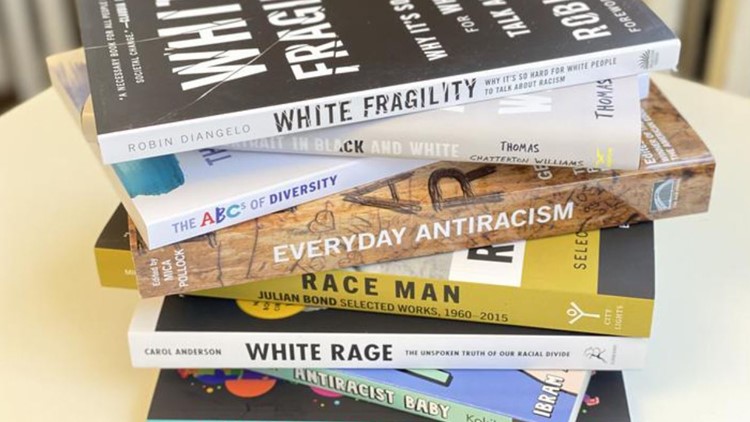ST. LOUIS — “White Fragility.”
“How To Be An Antiracist.”
“So You Want To Talk About Race.”
Such titles, once primarily tucked away in niche sections of bookstores, now top Amazon and New York Times bestseller lists in the wake of national outrage and soul-searching after the killing of George Floyd, an unarmed black man, by a white police officer. In St. Louis, 500-plus miles from the Minneapolis street corner where Floyd’s death triggered national protests, books about race have been flying off the shelves of booksellers and libraries.
“It’s just been overwhelming in the last couple weeks,” said Sarah Brown, manager of acquisitions and collection development at St. Louis County Library. “It’s incredible.”
Although the library’s 20 branches are only open for curbside pickup, Brown said the library has seen “hugely increased demand” for books about race across all formats (print, e-books and audiobooks).
The library’s most-requested title is “White Fragility: Why It's So Hard for White People to Talk About Racism” by Robin DiAngelo, which currently tops The New York Times’ nonfiction bestseller list. Prior to the nationwide protests, the library's print copies of the book were typically only checked out about once a month. As of Monday, the book had 375 holds on 11 print copies, 659 holds on 100 e-book copies, 489 holds on 40 downloadable audiobooks and 49 holds on three audiobook CDs.
“We have been repurchasing from our vendors like mad,” Brown said. The library is using its robust e-media budget to quickly add more e-books and downloadable audiobooks for wide range of titles (due to publisher restrictions, e-media copies are limited to one checkout at a time). Normally the library has a maximum limit of 100 e-media copies per book, but SLCL broke its rule to buy 140 e-media titles of “White Fragility” since June 1. Before that, the library had just 10.
St. Louis Public Library has also seen skyrocketing holds on a wide range of titles about race. Meanwhile, people who don’t want to wait months for a library book are turning to local bookstores.
“Stuff we’ve had for two or three years, we’re running out of,” said Michelle Barron, owner of 34-year-old independent bookseller The Book House in Maplewood. “We’ve got a ton of backorders.”
Barron said the sudden influx has doubled The Book House’s sales, which had fallen to just 25% of pre-pandemic levels. Barron credits media outlets and influencers for raising customers’ awareness of titles.
“Everybody’s got these reading lists, and (customers are) coming with the reading lists that have been posted, which is great,” she said.
A few miles away in Webster Groves, independent bookseller The Novel Neighbor has seen a 200% increase in sales of nonfiction books about race since May 27, two days after Floyd's killing. Sales of fictional works by black authors and illustrators are up, too.
Aside from “White Fragility,” some of the bookstore’s best-selling titles are “So You Want to Talk About Race” by Ijeoma Uluo and “Stamped from the Beginning: The Definitive History of Racist Ideas in America” by Ibram X. Kendi. Owner Holland Saltsman said she is ordering “cartons of the titles” to keep up with demand.
Kris Kleindienst, co-owner of Left Bank Books in the Central West End, said all of her store’s current bestsellers deal with topics of race.
“If it wasn't clear before why a bookstore needed to be open or somehow functional through Covid, it certainly got clear right away” after George Floyd’s death, Kleindienst said. “People need information, they need to process, they need to have resources. They look for books to explain things to children, to help with stress.”
EyeSeeMe, a black-owned University City bookseller that specializes in African American children’s books, recently hired three new people to keep up with demand. Owner Jeffrey Blair said when the national protests started and he looked at the orders coming in, he couldn't believe his eyes.
"I thought maybe something was wrong with my system," he said.
Although Blair said the majority of the demand has been for adult books about race, which EyeSeeMe has always stocked, there are also more parents inquiring about kids' books. Whereas 25% to 35% of his customers had been non-black before the pandemic, Blair said he's now seeing a 50-50 split.
"There's been a really big increase of white parents wanting to educate themselves and their children about racism," he said.
Click here for the full story.



